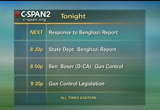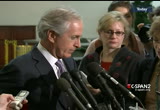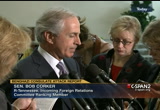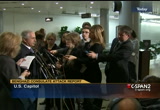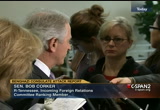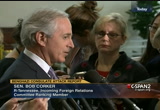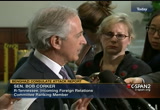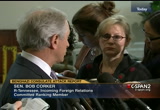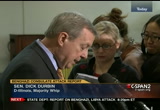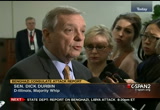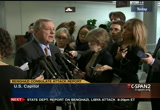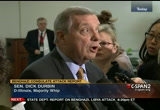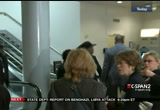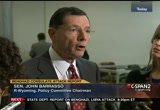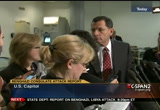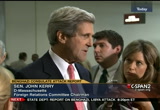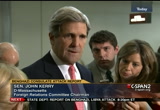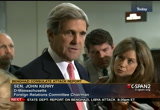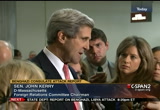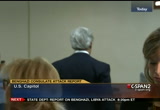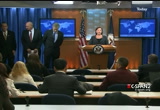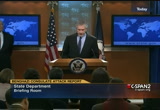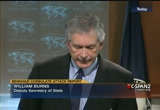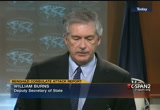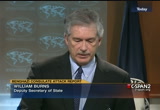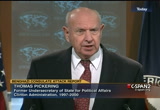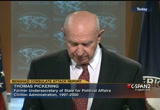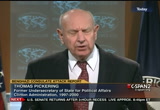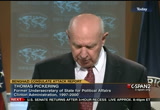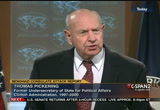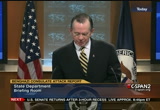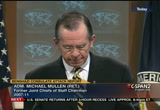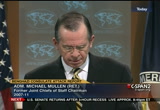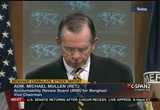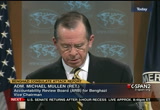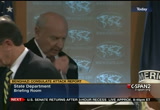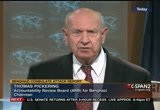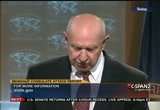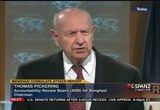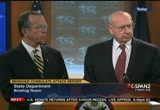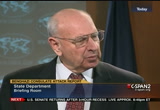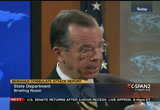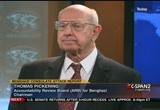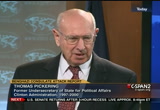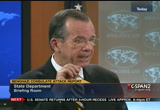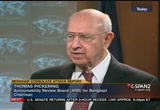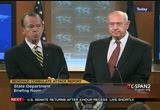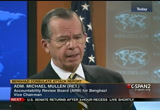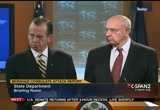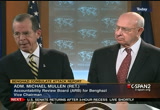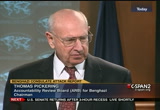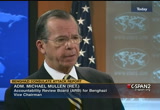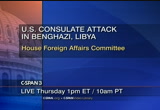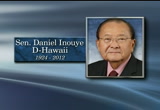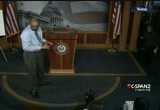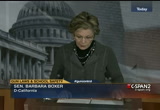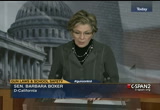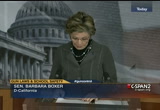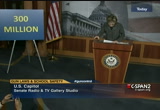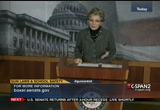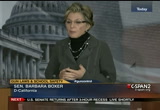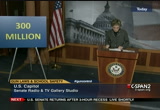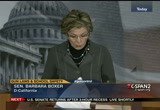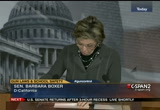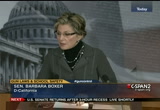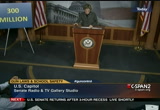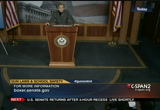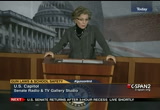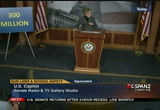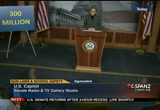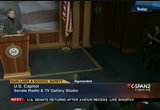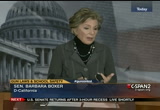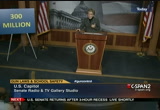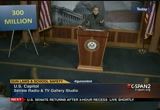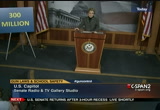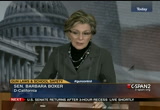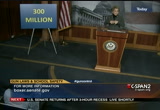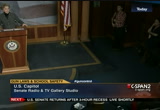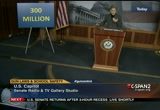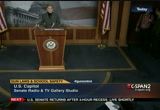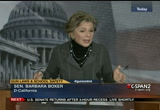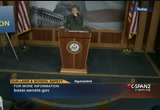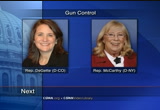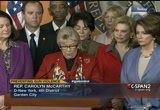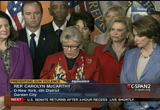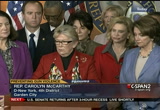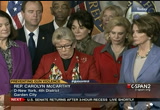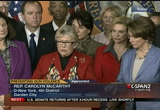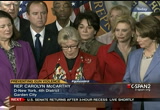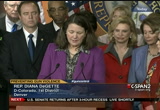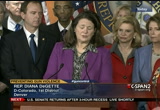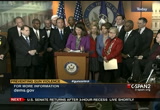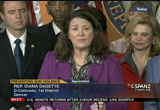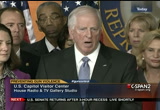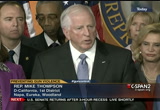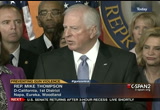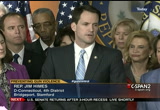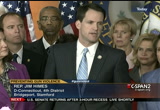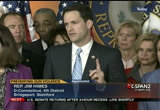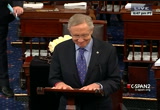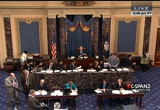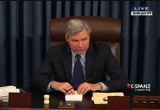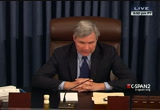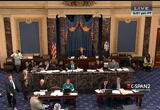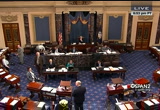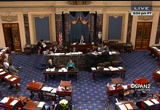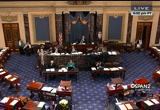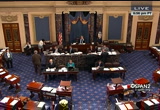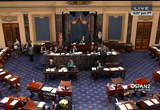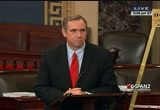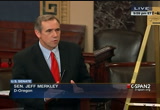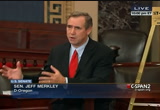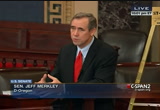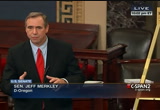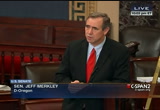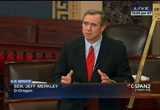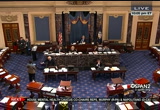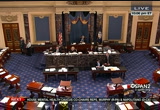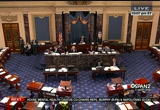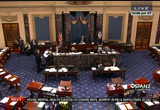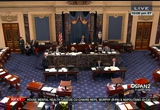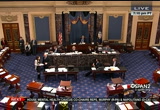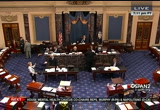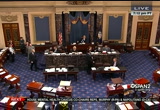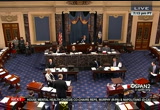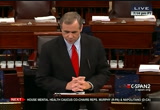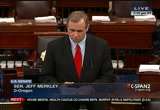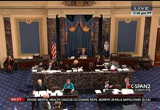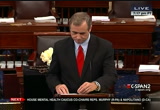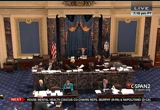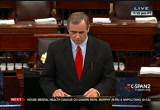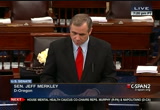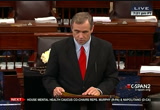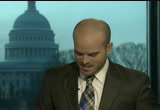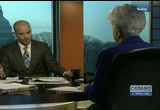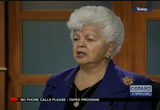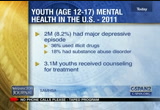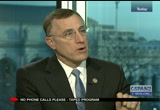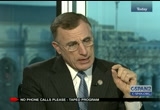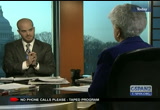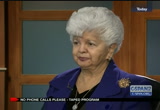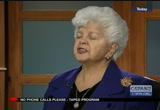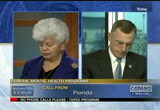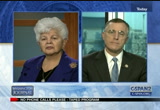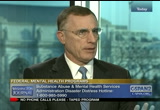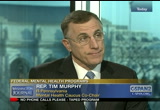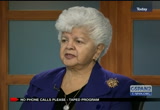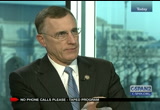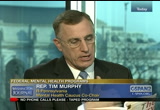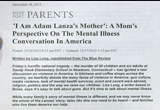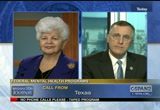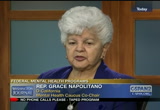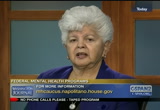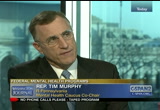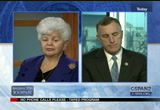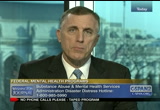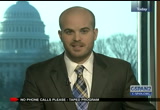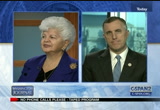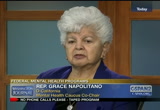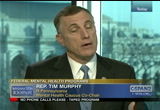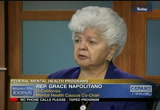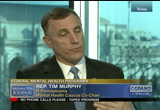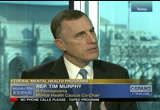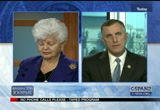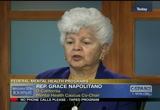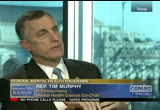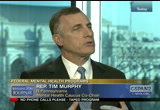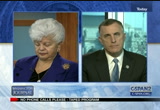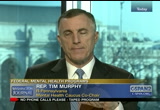tv Tonight From Washington CSPAN December 19, 2012 8:00pm-11:00pm EST
8:00 pm
8:01 pm
spoke about the report they offered on september 11 attack in benghazi, libya to cut u.s. ambassador christina and three other americans. the report cited systemic failures, leadership and management efficiencies and inadequate security at the conflict facility. three state department officials including eric boswell, assistant secretary of state in diplomatic security have resigned in the wake of the report. next, senators on the foreign relations committee who received the report speak to reporters. how not [inaudible conversations] [inaudible conversations] [inaudible]
8:02 pm
>> my understanding is that the standard with which the accountability board looks at people is a very high standard called breach of duty. but there's no question that there were people within the state department that were missed and did not execute in an appropriate way. there is also some cultural issues and i mean, there were no doubt a number of problems. i would just say to that end, i know that secretary clinton was unable to be able to testify in an open setting. i do think it's imperative for all concerned that she testify prior to any changing of the
8:03 pm
machine. i think that is very important for her. i think it's very important for a country and i think it's very important to really understand certainly the inner workings of the state department itself. the foreign money hasn't been authorization for the state department since i've been here. so there is no doubt, you know, i'm not that we could have done if you vote to understand more the inner workings of the state department itself. but i do think it's imperative that summer -- i'm sorry, secretary clinton to testify in an open setting prior to any secretary of state. >> are we knowing who did this attack? workgroup? >> gosh, yeah. the culmination of groups of a number of them bear.
8:04 pm
i think we generally known from day one that is part of libya controlled by militias. they generally operate under a very loose umbrella and, you know, it was a number participated developed, but the area is full of folks that identify themselves as being affiliated with al qaeda and others. but there's one particular group. i don't know if it's classified as to what the name of this group is, so i won't speak to that, but i think we're pretty certain it is. ibm lack >> and now, it's really interesting. everyone of these problems solution is more money. i've heard much of that town in the hearing room just a minute
8:05 pm
ago. and no doubt, security takes resources. but think again a top to bottom review of the state department to ensure the resources that already are they are are being used in an appropriate way for a beginning point and then it complaint, you know, determine what the appropriate resource allocation should be. i understand and secretary clinton implementing all of the policy points so nothing is being done done. and at the same time, it is manders and a brief type numbers of accountability review boards that have made recommendations in this group looking back, you know many of those have never been implemented. it's kind of an interesting point that there's been a lot of review boards, but many recommendations have never been implemented. we can all do a better job in fairness. i really believe that.
8:06 pm
the foreign relations committee of should certainly do top to bottom reviews, should it have prior to talking about additional resource allocations. i think there are cultural issues and people they are carrying out their duties. what's that? i think there were people there were very remiss in carrying out their duties no question. there are cultural issues. we as a country need to determine what we want to do without traditionary set of sleep this, where we are in a place for the country does not have control for militias are controlling it. we need to understand what the value to american diplomacy isn't having people in a place like to see, which is then not say. at the end of the day, it's important for secretary clinton and hope she recovers quickly.
8:07 pm
it's very important to come before the committee. if they could be very help a candidate for the next secretary of state to fully understand from her% than all of eyes, the cultural issues dealing with. >> are the recommendations for funding security? >> you know, numbers are thrown out. but i don't know how anybody could possibly be in a position to analyze that yet without a beginning of a top to bottom review itself. but there were numbers -- and by the way, i think one of the highest priorities we should have been so they had these brave men and women doing what they are doing for our country, we should absolutely sure there's appropriate security. believe me, i think that's number one. i met the two individuals who
8:08 pm
rescued -- rashard people injured from the roof at the consulate in benghazi. they truly are american heroes and we should do everything we can to support people who risk their lives in that regard. at the same time, we need to make sure resources allocated they are allocated properly with a with a culture in the department that understands the importance of security in that regard and with that, i thank you all. >> thank you. >> i just let the classified refrain from the accountability review board on the incident occurred in benghazi, an incident which cost for american lives in life of our ambassador. the conclusion was very stark, very candid and honest and told us the following. mistakes are made, lives are lost and lessons need to be learned. first, america cannot retreat
8:09 pm
from a dangerous world. it is important for us to be there, not only protecting values, but american citizens. those who represent us overseas better protection. not only does in uniforms, but this in site are to have important missions to perform. third, a break down on september september 11 that is stark and challenging to all of us in public life. i went through the litany of things given to us by the accountability review board. intelligence fell short. security personnel were inexperienced and unprepared. security systems failed. our host nation was lacking in protection for our own people and senior state department officials unfortunately showed a lack of leadership in energy and ability. that is a challenge to all of us. it's a challenge to assess this in an honest fashion and change
8:10 pm
policy to the resources and please don't make a difference. finally, we can provide protection for americans representing us in our nation require without adequate resources, without a security plan that is reliable and without leadership, which understand security threat we face. let me speak about resources for a moment. we are discussing a deficit. cutting spending is a common launcher and it's understandable. we need to cut spending to reduce its deficit. but when he took a step back and make an honest assessment of the sinks absolutely essential for america's security. people talk about department of defense initiative. let us not forget department of state. the role they prefer around the world is important to america's defense and assess important as anything else in terms of avoiding war and conflict in the future. but we learned in benghazi is we
8:11 pm
can't go with inadequate resources and inadequate preparation. congress is going to face a new challenge and i hope it includes making certain america's strong not only to the department of defense, department of state as well. last point if anyone who thought that an internal investigation and accountability review board will cost over what happened in benghazi needs to take a look at this report. ambassador pickering is one of our best. admirable it is also one of her best. the two of them have been extraordinary, candid and frank on a show that analyzing a delicate and tragic situation. [inaudible] >> yes. that was brought up several times. it was the conclusion of the accountability review board that there was no willful misconduct,
8:12 pm
which is the standard used to judge any breach in the department of state, but it is also clear there was a failure when it came to management and security in privacy. as a consequence, some of mr. defections is being taken in the state department as a result of that. [inaudible] >> should she be held responsible for this? >> she accepted responsibility and said as much weeks ago and that showed the maturity we expected our leaders when things go wrong, not to run away from reality. fishy face it honestly. she brought in this independent board have noted professionals and they come to a conclusion that is stark and traveling to her and all of us in government. we all need to do a better job. we await to ambassador stevens.
8:13 pm
[inaudible] >> i hope secretary clinton will be able to test. i know she's recovering at home and may not be any seeking to accomplish in my hope is only a few days left in the session. ultimately we need to present this to the american people. we've lost four of our best including our ambassador. it is a rare occurrence, thank god, but the fact that it occurred as a challenge to all of us. tell the american people would have been in honest terms and make sure we do everything to make sure it doesn't happen again. >> -- internal movements made in the state department to punish people who might've been responsible. did that come out of this briefing? >> okay, thank you. [inaudible conversations]
8:14 pm
[inaudible conversations] >> i just had a briefing on benghazi and would have ended my impression is that the state department clearly failed the boy scout motto is be prepared. they failed to anticipate what was coming because of how bad the security risk was there. they failed to connect the dots so they did not adequate security leading up to the attack. once the attack occurred, security was woefully inadequate. another report was thorough and thoughtful. my question is will actually be helpful to prevent further attacks and with the state department take the lessons learned and make sure in the future we can prevent things from happening like this. it was very, very critical in
8:15 pm
nature failures of the state department at very high levels. [inaudible] >> to discipline someone to the state department, you have show willful misconduct and i don't think there was any of that. clearly there was very poor judgments made within the state department. there is a failure readership at a very high level at the state department and failure to make proper decisions. [inaudible] >> i think those are the questions will specifically ask in the opening hearing tomorrow. thank you. [inaudible] >> i think there was a major failure in the state department that resulted in the deaths of four brave americans.
8:16 pm
this incredible stories of courage what happened during the attack, but they were in a situation which they were not going to be able to escape. thank you. [inaudible conversations] [inaudible conversations] >> how are you all doing? good morning. the foreign relations committee just listened to a classified briefing, but in the unclassified component of it and all of that, for every member i think was an extremely impressive, very comprehensive and very professional presentation and members of both sides of the aisle we join
8:17 pm
together in congratulating secretary clinton for appointing the accountability board of such quality and for adopting every single one of its recommendations. i think that is an extremely positive step. i think it is a courageous step and one that fully recognizes her responsibility as head of the department to make sure that every further effort is made to provide security personnel serving abroad. the quality of the report i think is really exceptional and i think you have to look at the two leaders that this, admiral mullen and secretary ambassador tom pickering. tom pickering has served as ambassadors several different
8:18 pm
locations. united nations, india, russia, israel, jordan, other places. and he served as undersecretary of political affairs. ambassador -- admiral mullen was chairman of the joint chiefs of staff and had been extraordinarily distinguished career in the united states navy. these are two men who didn't mince any words. they didn't hedge. there was candid and direct and i think this report is a quality report. the state department can take pride in it. the country is well served for the process put in place. secretary clinton said she would do this in david e. completely unfurnished appraisal and that's exactly what it is and i think she and the administration deserve credit for doing what was required here and really going to great lengths to make
8:19 pm
this sure is a very professional presentation. so tomorrow we will hear from the department on how they are proceeding forward. but i think the most important step is the report itself in the presentation later today. >> what administrative actions are taken inside the state department as a >> what administrative actions are taken inside the state department as a result of this report? >> everything the report has suggested has been embraced by the department and more. secretary clinton has sent out additional measures she think can contribute to advancing the interests set out in the report itself. so i think that will become clear tomorrow. secretary burns and secretary ninth will report in an open session and let open steps being taken. it is a huge step forward to address the lessons learned from them passé, which are important to everybody.
8:20 pm
or 70,000 employees of the day 275 different posts. people are at risk. it's a dangerous world we are in any think this report is going to significantly advance the security interest in those personnel of our country. a major stop there if they will pick it up tomorrow. [inaudible] >> yes, the report specifically calls on resources. there is a need to put about $2.5 billion a year over a number of years into efforts to strengthen our security sadness in various critical places that is, what will be talked about tomorrow also. thank you are very much. >> the senate foreign relations committee holds a hearing
8:21 pm
tomorrow on the attacks of the u.s. consulate in benghazi, libya. state department officials will testify about the security permission. investigators in the attack that security staff was insufficient at the posts. that hearing begins at 8:00 a.m. eastern. >> now, master tom pickering, former joint chiefs of staff, mike mullins with her purse on the benghazi attacks and deputy secretary of state william burns briefed reporters. this is about 30 minutes. >> welcome, everybody. thank you for joining us. as you know, the accountability review board on benghazi that the secretary established has
8:22 pm
now completed its work on the classified and unclassified versions have been released to the hill and it had a chance to see the unclassified version as well as the secretary's letter to members. today we have embedded the chairman of the accountability review board, ambassador tom pickering and pace chairman of the review board, admiral mike mullen to join us here to address your questions and introducing them will be deputy secretary of state, bill burns. >> thank you, very much and good afternoon. i thought they know, ambassador pickering and admiral mullen appear today before the senate foreign relations committee and the house foreign affairs committee to discuss findings and recommendations of the accountability review board on benghazi. deputy secretary nides and i'll testify tomorrow.
8:23 pm
i'll make two quick points and then give the floor to ambassador pickering and other want to the report and take your questions. first of secretary clinton said in her letter to congress, we expect each and every one of the board recommendations whenever he begun to implement them. in accordance with a lock on secretary clinton were to distribute to determine exactly what happened in benghazi because that's how we learn and improve and i want to convey appreciation to ambassador pickering, admiral mullen and their team for doing such a poor job. the board's report takes a clear eyed look at serious systemic problems, problems which are unacceptable, problems for which a secretary clinton has said we take responsibility and problems we averted because 26. in the hours and days after the terrorist attacks in benghazi at the secretary's direction we took immediate steps to further protect our people and our pose. we launched a worldwide review
8:24 pm
of the departments overall security posture. interagency teams nx risk a particularly scrutiny to high threat posed to the pentagon agreed to dispatch hundreds of additional posts around the world. the u.s. congress to hire new personnel and reinforce facilities. rios in the first-ever deputy assistant secretary of state for high threat posed up in the bureau of diplomatic security. and we are updating our deployment procedures to increase the number of experienced and well-trained staff serving up those posts. tom and i will be discussing all of this work and more congress tomorrow. so for now, let me just make one other point. i've been a very proud member of the foreign service for more than 30 years and have had the honor of serving as the chief and russian overseas. i know diplomacy by its very nature must sometimes be part
8:25 pm
just in dangerous places. chris stephens, my friend and colleague understood their diplomats cannot work in bunkers and do their jobs. we have a profound responsibility to ensure the best possible security and support for diplomats and development experts in the field. it's important to recognize that our colleagues in beers of diplomatic security, near east affairs across the department at home and abroad get a pretty countless times a day for years on end in some of the toughest circumstances imaginable. we cannot lose sight of that. do we have learned hard and painful lessons in benghazi, were arty acting on them. we have to do better. we have to do more to constantly reduce the risk people face and make sure they have resources they need. we owe that to our colleagues who lost their lives in benghazi. what over to security professionals who acted with such extraordinary heroism that
8:26 pm
awful night to protect them when you were to thousands of colleagues serving america with great dedication every day in diplomatic posts around the world. so with that, let me turn to ambassador to create an outdoor mall in. >> afternoon, all of you. thank you very much come the bill for the spicing pushovers, which i believe very much reflect the spirit in which we work and indeed the focus. i would also like to thank secretary clinton for her steadfast support, for our efforts and her ambitious approach to implementing our recommendations and of course we wish her a speedy recovery. in late september, secretary clinton asked me to serve as chairman of the accountability review board on benghazi en masse at my wallet to be the vice chairman. let me say what a pleasure it was to work with admiral mullen and other members of the board.
8:27 pm
but he in particular brought a special of wisdom and good sense to difficult and trying process. there's three other members of the board not with us today, but without him this report would not have been possible. katherine bertini, professor of administration is your excuse university and former chief of vacated by the united nations world food program and undersecretary general for management of the united nations. richard shimek, -- richard schinnick who served as direct your other bureau of overseas building operations and hugh turner, experienced a retired senior intelligence officer who spent 22 years in the business insert glasses associate deputy director for operations at the central intelligence agency. into an excellent state department staff let die fso
8:28 pm
uzra zeya, who made a major contribution to our work and without whom we wouldn't be here with you today. secretary clint and convened the accountability review board or tried to examine facts and circumstances surrounding september attacks on u.s. diplomatic security in benghazi, libya. as you on the outcome of these attacks resulted in the tragic deaths of four brave americans: ambassador chris stevens, glen doherty, sean smith, and tyrone woods. against the backdrop of so many unanswered questions about what happened at benghazi, i will first make clear our board specific mandate. we were not asked to conduct an investigation into the attacks to find out who perpetrators are what their motives. that is the statutory role of the federal bureau of investigation and the intelligence community.
8:29 pm
we enjoyed excellent cooperation with both of them throughout the report. underwhelmed at that shoot from the secretary clinton asked us to examine whether the attacks are security related. other security systems and procedures are adequate and implemented properly. the impact of the availability of information and intelligence and whether anything else about the attacks might be relevant to appropriate security management of u.s. diplomatic missions around the world. we were also asked to look at whether u.s. government employee or contract or breach his or her duty. basically wanted to find lessons to be learned. other to protect americans from future attacks. to do all that, we interviewed more than 100 people, reviewed thousands of documents and watched hours of video. we spoke with people who were on the scene in ghazi that i, who were in tripoli, who were in
8:31 pm
>> what they had was not enough. either in benghazi or the overwhelming numbers. frankly, the state department had not given security for personal resources it needed. on that note, let me ask admiral mullen in regards to the specific findings. >> thank you, mr. ambassador, i appreciate that. i do appreciate your leadership throughout this process as well. good afternoon. the board found that the attacks on benghazi were security related.
8:32 pm
responsibility for the loss of life committee injuries, and damage to u.s. facilities rest completely and solely with the terrorists who conducted the attacks. that does not mean that there are lessons to be learned. the board found that the security posture at the special mission compound was inadequate for the threat environment in benghazi, and in fact, grossly inadequate to deal with the attacks that took place that night. state department bureau that was supporting benghazi had not taken on security is a shared responsibility. so that support the proposed needed was often lacking and let to the working level to resolve. the building did not meet department standards for office buildings in high threat areas. in a sense, they'll through the cracks of your country by being categorized as temporary residential facilities. a number of security upgrades were done in 2012.
8:33 pm
at the time of the attack, it did not have all the security features and equipment it needed. the board also found that the rotational staffing system and the inadequacy of the diplomatic security staffing numbers in benghazi to be a major factor behind the weakness of the security platform. the continual location of agents and on the ground knowledge and continuity and security decisions and implementation. the question is not simply whether an additional number of agents would've made a difference on the night of september 11, which is very difficult to answer. but whether a sustained and stronger staffing platform in benghazi come over the course of 2012 could have established some deterrence by giving it the continuity inexperience on the ground another.
8:34 pm
another deficit with the inherent weakness of the libyan support element, adding to the strong central government presence in benghazi. the special mission had to rely on the militia would uncertain reliability and unarmed local content guard sources. neither libyan groups performed well on the night of the attacks. overall, the board found that security systems and procedures were implemented properly by american personnel, and those systems themselves in the libyan response fell short on the night of the attacks. personal performance to the best of their abilities, and made every effort to protect and rescue and recover ambassador stevens and sean smith. there decision to are the special mission without ambassador and was precipitated
8:35 pm
by a second armed attack on the compound from the south. benghazi, tripoli, and washington coordinated effectively with each other. the looped in the military right away and the interagency response was timely and appropriate. but there simply was not enough time for u.s. military forces to have made a difference. having said that, it is not reasonable and feasible to tether u.s. forces to respond to protect every high risk posed in the world. and we found that there is no immediate warning of the september 11 attacks. but there was a knowledge gap in extremist militias in libya and the potential threat that they pose to u.s. interests. although some threats were known. in this context, increased violence, targeting of foreign diplomats, and international organizations in benghazi failed to come into clear relief against the backdrop of
8:36 pm
widespread political violence and enter militia fighting, as well as the growth of extremist camps and militias in eastern libya. while we do not find that any individual u.s. government employees engaged in willful misconduct or knowingly ignored his or her responsibilities, we did conclude that certain state department bureau level senior officials in critical positions of authority and responsibility in washington demonstrate a lack of leadership and management ability appropriate for senior ranks in the responses to security concerns posed by the special mission. i will now ask ambassador pickering to give an overview of the board's overarching recommendations. >> thank you, admiral mullen. with the challenges of the future and lessons of the past, we put forth recommendations in
8:37 pm
several key areas. we are recommending that the state department undertake an urgent review to determine the proper balance between acceptable risk and mission tasks and needs. in high risk and high threat areas. the answer can't be not going to dangerous places. but there must be one of clear mission. a clear understanding of the risks. a commitment of enough resources to mitigate those risks. in an explicit acceptance of whatever risks cannot be mitigated. this balance needs to be reviewed regularly and continuously because situations change. next, we recommend the department develop a minimum security standard for the occupation of temporary facilities in high risk and high threat environments. in the post-receive the equipment and supplies that they need to counter various types of
8:38 pm
threats. we also believe the state department must work with the congress to expand funding to respond to emerging security threats and vulnerabilities and operational requirements in high risk and high threat posts. we found that a number of recommendations from the past have not been implemented fully, and they relate very much under the recommendations we will be making or had made to the secretary that the congress will have to play its role in filling. as a result of extempore status, this man was unable to get some of the security upgrades and some of the security oversight which was needed. we recommend various improvements in how temporary and high risk high threat posts are managed both on the ground and from washington so that they have the support that they need. there should be changes in the
8:39 pm
way the state department staff supposed like benghazi, to provide more continuity and stability. the posts have sufficient mac security agents with other security personnel were needed. we also recommend that it is re-examined so that albeit special attention needed from management. the special review should look at the use of fire as a weapon and how to counter it. the state department should establish an outside panel of experts with experience in high risk and high threat areas. a kind of red flag to make change and make recommendations to the department security officials. now we would be happy to take your questions. we appreciate you giving us this
8:40 pm
opportunity to brief you on our report. >> [inaudible question] >> the report seems to indicate either rank incompetence or a complete lack of understanding of the situation on the ground. my question is, after the 1998 bombings and the arb came out with a series of recommendations -- the water ones are very similar. those bombings in east africa were supposed to have happened.
8:41 pm
>> it is very clear that under the law and in connection with the state department regulatory department, one has to find willful misconduct or similar kinds of action in order to find breach of duty. indeed, one of our recommendations is there is such a large gap between willful misconduct letters of reprimand and separation, for example, being removed from duty -- we believe that that gap ought to be built. but we found, perhaps, close to come as we say in the report, that there were inadequacies and those are the ones that we believe ought to be taken up. we have made recommendations to the secretary in that regard.
8:42 pm
>> i'm sorry, just one second. what happened? how did the lessons -- >> let me just mention that, and then admiral mullen may have something to say. we, of course, have made a recommendation that a partially implemented recommendation of all previous laws have been rapidly reviewed by the inspector general with the idea in mind that we are assured they are carried out. if you read the report, you will see in part recollections in the past, as well as in nairobi and other recommendations the that need to be carried out. we very much agree with the impetus of your question. >> i think it begs the question of why did that happen. honestly, time is always a factor. clearly, no specific follow-up over time. one of the major recommendations of the building plan, which fell
8:43 pm
off from 10 embassies a year to three. tied to budget constraints and et cetera. so i think it was a combination of factors. while 1999 is certainly close to this decade, the world has changed radically in this decade. the risks that are associated with that world are, i think -- we are in a much more difficult and challenging position with respect to meeting the needs to be out there and doing so in a way that our people are very specifically secured. >> there is a specific recommendation for a ten-year program. a very significant level of funding, specifically to meet the point that admiral mullen made that are building programs. it needs to go back to the original target. >> ambassador, you are extremely critical of the performances of individuals in the view of
8:44 pm
diplomatic security. the middle east bureau. this is part of a hierarchy of organization known as the department of state. each has a chain of command. and they report the policy changes and diplomatic security changes -- they are under the secretaries and deputy secretaries, and the secretaries themselves review desperate was the highest level at the department of state where you take responsibly for what happened in benghazi? >> it is not the assistant secretary level. it is fixed there. which is, in our view, the appropriate place to weighted decision-making. in fact, that is where it takes place. where the rubber hits the road. one of the interesting things about the statutory basis of the review board was that it clearly was biased against the idea that
8:45 pm
one's that automatically cool, as one often does, the leader of a particular department or agency responsible without pinpointing the place where the fallacy took place and the lessons we derived from that ought to be important to fixing the problem. so fixing the problem and finding the locus of the difficulties was the major task to undertake. >> i would add to that that certainly that was a concern that we had as we initiated the review. secretary of state has been very clear about taking responsibility here. from my perspective, it was not reasonable in terms of her having a specific level of knowledge and that was very specifically resident in overtime, that was brought to attention.
8:46 pm
>> thank you. i was when asked about this. you offer the 29th recommendations. when unclassified, there were only 24. without getting into any classified material, can you characterize what these recommendations are -- they have to do with intelligence -- also, you said that there was common in the report, that there was no protest or mom. how did you come to that conclusion? >> to keep this brief, it would not be charitable to say that some of those involved in involve intelligence. we arrived october 4, 2012, for our first meeting. at that point, we found the intelligence community had clearly concluded and provided us that conclusion that there was no protest.
8:47 pm
>> when i quickly follow up on the intelligence issue. you were reporting to the secretary. he said that perhaps he could involve intelligence. would you also be reaching out to members of the intelligence community and breaking them and helping them implement this? >> i think without stretching the point, we demand the secretary's disposal for whatever use you would like to make of it. >> and she has made it available to all. >> two things, can you confirm the resignation of department personnel today in association with this report and give it is the tail on? secondly, admiral mullen, you talked about a poor understanding of the nature of the malicious threat. whose responsibility should have
8:48 pm
been a better matrix for that. and if that information had been provided as it should have been provided, do you think it would have been advisable for ambassador stevens to make that trip? >> this is obviously a department issue that should be addressed at the department. secondly, it is very clear this is a country in transition. one of the umbrella organization that comes out with respect to lack of support that night for security response, which was the expected response, as we dig into this, it is a very loose group of local militias that flow in and out of that umbrella over time. i think that is representative of the intelligence gaps that existed at that time. in eastern libya probably, not just for us, but for many countries that were out here. i think you have to take that into consideration in terms of
8:49 pm
understanding the environment, and in terms of what was out there but the potential was. >> we also take into account the bolivian government was almost absent from the scene in terms of its responsibilities. in many ways, on piggery 17, as difficult as it was, they have responded positively and a less threatening question in the past was the best that anyone can find. to in the report, you specifically referred to the idea that the ambassador did not fully formed this kind of movement. why is that relevant here? what role did the ambassador have been a lead person wee person in libya in terms of determining security? it is my understanding that investors don't normally notify each and every movement. why was that specifically refer to?
8:50 pm
>> because it is a question occurred to many people and we felt we should answer it. particularly because the ambassador is the person who has the responsibility for security at his post. >> and does not have the requirement by anybody outside the country. >> so when you are talking about the militia, is it correct to understand that ambassador stevens had a role in deciding their security? >> chief of mission, we certainly had a responsibility in that regard. actually, he was very security conscious and increasingly concerned about security. but part of his responsibilities was to make that case back here. and he had not gotten to that point where you might get to a point where you would be considering it so dangerous of
8:51 pm
omission. >> as you know, on the anniversary day, 9/11, on the advice of his security officials, spent his entire day inside the mission. >> [inaudible question] >> we will take one question more. >> thank you. just to follow up on the last question. would you say that ambassador stevens does share some of the blame here for the lack of security? is that what you're saying here? >> very clearly in the report, if you read it, we made our indications open and transparent about where we felt the problems were in terms of decision-making. ambassador stevens on several occasions was supportive of additional security and watching it very carefully and knowing what was going on. ambassador stevens had perhaps the best knowledge of benghazi
8:52 pm
of any american official. that was taken in washington, certainly, is a very serious that her conclusions on his part. to just to follow up, why such a passing reference to military involvement? can you explain why they couldn't have done more? >> we look at the posture very vividly. this was over in a matter of 20 or 30 minutes with respect to special mission specifically. and we have no forces ready or tethered focus on the mission so they could respond. nor would i expect we would have. i noticed that there was no mention of the cia in the report. despite the fact that they have
8:53 pm
more personal they are. do they share some blame? [talking over each other] >> it's not an organization. >> thank you very much to the chairman and vice chairman. you think you. [inaudible conversations] >> coming up next, more on the u.s. consulate attacked and benghazi, libya. testifying about the security of the mission. investigators into the attack said security settings and submission of the post. that hearing begins at 8:00 a.m. eastern. those officials will also be testifying in a house foreign affairs hearing tomorrow at 1:00 p.m. both of those hearings will be live on c-span3 and he spent at work. tonight on c-span2, senator
8:54 pm
barbara boxer discusses two new gun control measures. after that, carolyn mccarthy leads members of congress in a briefing calling for stricter gun laws. cochairs of the house mental health caucus, tim murphy of pennsylvania and grace napolitano of california talk about the government's role in funding mental-health services in the united states. >> if we turn away from the needs of others, we align ourselves with those forces which are bringing about this suffering. >> the white house is a great place. >> obesity in this country is nothing short of a public health crisis in i think i have little
8:55 pm
antennas that pointed out to tell me when somebody has their own agenda. >> i think they serve as a window on the past to what was going on with american women. >> she becomes the chief confidant. she is really the only one in the world who can be trusted. >> many of the women who were first ladies were writers. a lot of them were writers. they wrote books. >> they are, in many cases, i think more interesting as human beings than their husbands are. if only because they are not first and foremost defined and limited by political ambition. >> dolly was socially adept and politically savvy. >> dolly madison loved every minute of it. monroe absolutely hated it. >> you know, you can't rule without including what women want and what women have to
8:56 pm
contribute in during the statement, we are a little breathless. >> is probably the most tragic of all first ladies. >> they never should've married. >> she may have wrote in her memoir and she said i never made any decisions myself. i only decided what was important in winter presented to my husband. >> if you stop and think about how much power that is, that's a lot of power. >> part of the battle against cancer is to fight the fear that accompanies the disease. >> she transformed a way that we look at these bugaboos and made it possible for countless people to survive.
8:57 pm
and of course as a result. i don't know how many presidents realistically have that kind of impact on the way we live our lives. >> just walking around the white house grounds, i am constantly reminded about all of the people who have lived there before, and particularly, all of the women. >> first ladies influence an image. a new series on c-span. starting presidents' day, february 18. >> senator daniel inouye, a world war ii medal of honor recipient, died on tuesday at 88 years old. congressional leaders will hold a service and has honor. members of the public will be allowed to view his casket in
8:58 pm
the rotunda from noon to 8:00 p.m. eastern. friday at 10:30 p.m. eastern, the public memorial will be held at the washington national cathedral. >> oct bill and a report for the mods to be stricter. this will expand access access to certain grants and other safety and security measures. this is about 20 minutes. [inaudible conversations] >> good morning area i am here
8:59 pm
today as a mother and grandmother whose state has been touched or too many times by gun violence, including mass shootings. in january of 1989, a deranged gunman stepped into the grounds of an elementary school in california and fired at least 100 bullets from an ak-47 rifle across the schoolyard. he killed five children and one teacher and injured 29 others before shooting himself. that led california to enact our state assault weapons ban. californians still remember this tragedy. just as the nation will always remember the victims of sandy hook elementary school. i know it means when someone close to you is suddenly taken away in an unspeakable way. my family was touched by the
9:00 pm
brutal mass shooting at a loppers in san francisco in 1993. where a crazed gunman with an assault weapon killed eight people and wounded another six people. one of those people was a brave young lawyer who threw his body over his life to save hers. that young man was one of my sons best friends. i can tell you beyond a shadow of a doubt how these horrific and senseless tragedies live on forever. the parents and spouses and children, their families, it changes their lives forever. since 1999, which was the year of the massacre at columbine high school, we have tried to talk about this.
9:01 pm
250 students, teachers, and others, have been killed in school shootings. another 212 have been wounded. due to gun violence in our schools. i will break down just some of those. a 2005 shooting at red lake high school in minnesota left five people injured. an amish schoolhouse shooting in pennsylvania in 2006 left it's dead and five injured. a gunman killed 33 and wounded 23 others at virginia tech in 2007. earlier this year, seven people were killed and three were injured at oakland university. the slaughter of innocent must stop. whoever criticizes me or others for saying so, saying that we must act, who ever said this is
9:02 pm
not the right time, i ask this. one is the right time? let me show you a number. look at this number. this is just about the population of the united states of america. it is also a record of the 300 million firearms in the united states today. nearly one gun per person. i say that now is the right time to talk about this. more than 31,000 people die each year from gun violence in our nation. let me say again. those are the last numbers. 31,000 people died. eighty-seven people die every
9:03 pm
day. now, i got into politics in part because i felt the vietnam war was wrong. and i was pining for those who are lost. about 50,000 dead in the vietnam war. every year, 31,000 people died. so when is the right time? we must talk about it now. that is what i am doing, and i am so proud of senator feinstein for doing this and senator schumer for doing this as well. and also my colleagues in the house. i'm proud of the president for doing it as well. we must talk about it now. but here's the thing, we must do more than talk. we have talked before. we have cried before. we have lamented before. so we must act. to me, there are several things that we need to do. and i'm going to talk to you about one of those things. but let me list what i think we need to do. first, we have to take the weapons of war off the street.
9:04 pm
we have to take the weapons of war off the street. senator feinstein has the dell. set senator lautenberg has the bill as well. we must make sure that law enforcement is involved with conceal and carry permits. the local sheriff will assist you in california if you want to conceal and carry a weapon. third, we must close loopholes. background checks should be conducted on everyone. fourth, we must keep our guns out of the hands of the mentally ill and get them the help that we need. finally, i'm going to talk to you about today is something i have been pushing for years. it has to be front and center in the conversation. we must keep our schools safe by
9:05 pm
utilizing all the law enforcement tools at our disposal. millions of weapons are in our country today and are sometimes brought out on the streets. so we can't figure out a way to reduce that. so what i call in my view is my in the meantime strategy. we have to keep our schools safe. when our children and grandchildren are in school, we have to be sure that they are safe. look at what we have here when we come into the building. all of our families breathed a little easier. so i'm introducing a bill to protect our children in school. the first one is actually part
9:06 pm
of the violence against children bill that i wrote a long time ago. it is called the school safety enhancement act. what it would do is help schools utilize to provide schools with more resources to install tip lines and surveillance equipment and secured entrances and metal detectors and other important safety measures. right now the program is a 5050 match. my bill allows the justice department to reduce local share to just 20% to those who make the case for more generous care. the bill also creates a task force between the justice department and department of education to develop pool safety guidelines to protect our schools. there is no need to keep reinventing the wheel. we know what works and what doesn't work. my second bill is a new idea. it is called sos. save our students.
9:07 pm
it would expand a successful national guard program in place since 1989 that allows assistance with law enforcement efforts related to drugs and addiction and counter drug activity. so we take a successful program and we say, we are going to add a new system. that is what we do in legislation. it could be used to help support law enforcement agencies in protecting our children at school. this could take the form of additional guards at school as well as capital improvement such as strengthening the promoters at school and safety procedures. it would remain under the command and control of the government. and it would be subjected to all applicable state policies and laws, including regarding the use of force. now, the national guard has
9:08 pm
written its latest manual, and i quote, they are particularly well-suited for domestic one enforcement support missions because it is located in over 3000 local communities throughout the nation, readily accessible and exercised as local first responders and experienced in neighborhood communities. that is a quote from the national guard. this week, congress is going to approve a bill that i support. it's been $640 billion on national defense. that is more military spending in six countries combined. national defense. is it not part of national defense to make sure that our children are safe? dwight eisenhower certainly thought so. he said education is the guardian of our democracy.
9:09 pm
not our military defenses, not even a democratic system, for all of these are worthless if we lack the brainpower to support and sustain them. so he believed it was national security to make sure that our children are educated. how can our children be educated if they are not safe and they cannot concentrate, and doctor but they are cut down. so i feel very strongly that this is an appropriate use for the national guard. we spend over $600 billion every year in national security throughout the world. so i ask, when we doing to protect our children from gun violence at schools? the answer is not enough. the president asked us if we are failing our children? are we doing now? clearly i'm a we are not.
9:10 pm
the shooting at sandy hook elementary school is a reminder that we have failed our children. over and over again we have failed at the most basic task at keeping them safe. so let's pull together and show our children we love them, and we will protect them by taking these clear and common sense steps. we have to look at our gun laws and pass commonsense gun laws, and we have to, in the meantime, protect our children at school. i hope that we will do all of these things together. i am happy to take any questions that might have. >> are there any republicans working with you on this? >> you know, i haven't talked to anyone yet. because what i want them to do is to lay down a marker on these bills. and i will be working over the break to have one.
9:11 pm
in order to gain support. >> [inaudible question] >> can you shut the door, please? >> [inaudible question] the national guard troops -- [inaudible question] since the last time that happened -- >> that is not what has to happen at all. i was the first person to suggest national guard at the border. the way that we did not was to have the guards released the border patrol that were sitting at desk jobs to get them on the border. one way to utilize these guard troops is to have them believe the police officers. so it doesn't have to be national guard at school. maybe feel the same way about police officers. i don't know. i certainly do not. i certainly did not feel that way when two officers were at
9:12 pm
school. i say that god somebody's doing something. we need trained law enforcement under the control of the government. under the control of the state. >> could you shut the door? >> thank you. >> did you have a conversation about how this can work? >> i have talked to one enforcement all over the country when i wrote my violence against children act and i have tremendous support for that piece of legislation, law enforcement support that. on this new piece, i haven't spoken yet. but i think it makes sense. we need a conversation about this.
9:13 pm
people say doesn't is still different to you and all of these other bills? this feels different and it seems different. and i think it feels different because it's been in every home in america. it has touched every home. i can't call the president and asked asked if he supports it. i don't feel the necessity to talk to every college. this is an idea. it may be accepted or rejected. i hope it is accepted. i'm going to work on it being accepted. this is a time and you can see a lot of colleagues coming to the microphone. and they are not calling a lot of people. they are talking about what is going on in their brains and hearts because each of us is responsible. i feel an enormous responsibility to do something about this. and i have for very long time. i hope vice president biden, who
9:14 pm
is in charge of the task force, i hope he is in support of this idea. no, i have not talked to my my college before laying down a marker on us. keeping schools safe has really not been in the conversation. and i and i want to say again why this is so critical. 300 million weapons are out there. nothing i know is going to change that. in the meantime, we better keep our kids safe. if we avoid looking at that question, i think we are failing. >> [inaudible question] >> i'm confused about what action the national guard took. >> that the governors. they won't have national guard supplement their law enforcement. it is up to them. they would apply, just as they do a counter drug efforts, to the national guard. and they would say, here is the plan. we would like to have -- i'm just making up a number, two
9:15 pm
officers at every school. but all of our officers are tied up, and we think is the national guard to help us believe some of the officers, you could put them to work their. maybe doing dispatch or something and we could put two officers at the school. another example would be we think we need to have some protection and how would you handle this to make capital improvements here? better doors and windows. better security. so it is really up to the government. i don't have any idea of what they would need. so that is why this is so good that we give them this legislation. 100% flexibility. they want to have the help of the national guard, if they want, they can get it. or it could be improvement in capital improvement.
9:16 pm
>> there has been a lot of reporting about the power of the gun laws. [inaudible question] >> i was going to make a speech tomorrow and i am praying that it'll come up with some solutions to get guns off the street and maybe supporting school safety and maybe supporting increased mental health for people who need it. i think all of those things are important. i don't know what they're going to say. tomorrow is the big day in terms of seeing whether or not this change will take place. i can tell you that at home last weekend, people are running up to me as i walk around my
9:17 pm
community. several of these people were proud gun owner's. she says i carry a weapon. i don't like what i see. it east on assault weapons off the street. so here's the thing. i have had 11 straight victories and the nra has always gone against us big-time come every time. big-time come every time. we have managed most effectively in most ways. i think that it can be overrated. and i think the biggest nightmare that the people wake up and now understand that no
9:18 pm
one that i know of in the united states senate believe that people shouldn't have the right to a firearm. no one. we don't believe that sportsmen should have the right to go hunt. the nra has fooled people into thinking that the people who don't support the freedom to have, if i could say, an ak-47 -- they are trying to paint people like me to want to take away everyone's rightful ability to carry a weapon. so i think their biggest nightmare is the truth coming out. i think this is bringing the truth to light. i don't personally worry about them. i hope, and in this job, when
9:19 pm
something is critical and controversial, and some people may not love it and, you know, can i do this? will i ruffle some feathers that i put my job in jeopardy? because maybe i was once a reporter and i will report on something that's not popular. my point is that we all have those moments when we have to decide what is the most important thing. us or the innocent? i think this is the time to choose the innocent. i just pray that this happens for the country. because i can tell you it sure as i'm standing here, that i will be back here if we don't do something to protect our schools and keep these weapons off the street. yes, sir? >> a technical question, if you
9:20 pm
will. >> [inaudible question] >> that's a great question, because of who pays. in other words, right now they can do it. or they bear the brunt. this is a special program that was set up for drugs and addiction. because congress believes this is bigger than state issue. it is a national issue. my point is that i believe protecting our children is a national issue. they are a national treasure. president eisenhower -- that's why i read what he said about the importance of children and their security. under this law, the governors can apply and when approved, they can get 100% of the plan paid for. that is why so critical. you're absolutely right, they could do it on their own, they would have to pay for it.
9:21 pm
>> yes? >> what we have done is limited to 4000 and, of course, we don't know whether or not people will take advantage of it. we can go back and tell you the costs and we will give you that. >> [inaudible question] clearly, i believe in protecting the schools with professional law enforcement personnel. i'm glad he made that point. it is unacceptable. our teachers now have become
9:22 pm
policemen. they have to be in a situation where they make judgments and they are going to be in a situation where a problem student cause problems. this proposal is an answer to that proposal. let us get sufficient law enforcement to the schools. we should do that. the bottom line is security at these facilities. to me, it is so clear. look at what we do here.
9:23 pm
we are responsible for protecting school. this is america, we can do this. we have a defense budget with six countries combined. >> i'm talking about protecting our schools. that is my legislation. i strongly support senator feinstein's legislation and senator lautenberg. i have my own requirements. if you are asking me about my colleague who in the past have not supported this, i think you
9:24 pm
may see a change. senator manchin, when he was running, [inaudible] >> the senator has spoken out i think that when the senator speaks out in senator baucus says he wants to look at it, that is -- i don't know where the nra will wind up. hopefully i can speak for everybody. there is no reason to be polarized over whether our school should be protected.
9:25 pm
>> we were waiting we were keeping the bill open. there was no filibuster on it. so i don't know where it's going. i am going to follow through with this in the meantime strategy. let's do it by utilizing laws on the books. they make it easier with a better cost-sharing to make capital improvements at many schools want to do and can't afford to do. number two, expand the national guard program, allowing the governors to be reimbursed if they choose to put a plan forward, because that is who will make the decision.
9:26 pm
i want to thank you all for being here. it's a very emotional time for a lot of us. a lot of you, and we lost daniel inouye. lotus channel does for the good of our children. thank you very much. [applause] [inaudible conversations] >> minority leader nancy pelosi led a group of house democrats and the news conference promoting the banning of assault weapons and high-capacity clips, as well as other changes to gun laws. most of the members who spoke either lost a relative to gun violence or workshop themselves. this is 50 minutes.
9:27 pm
>> as we tackle these concerns, it is important to note that these actions do not eliminate the need to ban assault weapons. and also assault magazines. high-capacity additions that make these guns assault weapons and her colleagues will speak to that. we bring to this debate personal experience. the tragedy in newtown, connecticut, struck a chord with americans. we have to respond. it is confiscated and hard, but we can get the job done to calibrate legislation that really is effective. love animals and music and those who mourn the lives of their teachers, principal of the school.
9:28 pm
and we have been ensuring the safety of our schools and neighborhoods and to build future of safety for all americans. with that, i'm very pleased to introduced introduced this inspiration to the nation. >> thank you, leader closely. i want to thank my colleagues. we have been here before. we have been here before. but this time, the time is different. i want to thank you for the coverage that you have given the rest of the country to read the stories that have been going on
9:29 pm
9:30 pm
abbas has been great before christmas and my son was fighting for his life in icu on christmas day. this business for the unopened present in the and all the holidays in the future will be a reminder for all these families. as a parent, it reeks your heart. it makes you fear for your child's safety. the shootings in connecticut has crept this nation. this is a nation of parent. so i'm here today to call on my republican friends. and they are my friends, i'm off a lot of them are my friends. but i want to call afloat together as americans to join a in supporting our efforts to reduce gun violence in america. i said earlier that no seat
9:31 pm
again and again. this time it's different. you know the time is different because there's so much anger. when you talk to people, there's anger behind their voices. why are we allowing this to continue to have been? there's always sadness after a mass shooting. first public morning, but the anger for the american people are set up with that gun violence were seen in our country. anger from people fed up with the gun lobby, the tactics they use down here in washington and the anger from the peep of who are very honest with you fed up with the lack of courage, the lack of courage to your in washington to take a stand, to do something. we can protect the second amendment rights, but we can
9:32 pm
also protect their communities. you know, when the nra responds to these kind of mass killings, they really hide. you don't hear from none and i know you'll be hearing from them soon enough. but even this time, they shut down their face but because they didn't want anyone to read what was on there. this time is different because now we have a president that is standing behind us. we saw his tears when he spoke on the day of the shooting. he spoke as a parent and i have no doubt of his sincerity. he made a strong case for action when he spoke at the memorial service on sunday and i'll be honest with you, i was surprised by what i heard because he was more than he's ever said before
9:33 pm
and yet even on a very sensitive time, a moment, you could still hear the strong word that something needs to be done. yesterday the white house, press secretary got very specific, saying the president is open to supporting a new assault weapons ban, which i'm introducing with mr. perlmutter. the gun check act were supporting nature dues to senator schumer and the ban on high-capacity assault weapons, which i sponsor senator lautenberg and have been introducing cynthia saw a expired in the year 2004. this is not something new. this is not something new. we know that with the extinction of the search magazine, we did not see the kind of killings we have been seeing in recent years. so for many people in this
9:34 pm
country who are trying to reduce gun violence, this moment is different. i'm asking my republican friends to work with us. it shouldn't be it democrat or republican issue. it is all of us as americans who are mourning the death of me. we don't want to see any of the shootings again. work with us to save lives because we can do this. work with us to make sure our children get to go up the knife to their fullest potential. work with us to produce these tragedies in all of our communities across the country. work with us so we don't have to cover the funerals. that is not who we are as americans. i know there are differences, but can't we come together this one time to save lives?
9:35 pm
i want to send a message to my republican friends and even a light of my democratic friends who have been shy about showing in this movement. not to tell them it's time because it is different and it's okay to work to reduce gun violence. the american people will stand behind them. i want to make this point. the gun lobby doesn't work for us. they work for the guy manufacturers. everybody knows that, but everybody is afraid to talk about it. they do not work for the american people and the american people are starting to see that. most americans, including gun owners and nra members believe in keeping guns out of the hands of the most dangerous people. over 75% of them do and that's just one more thing we can do. many other americans want to see the high-capacity assault weapon magazines be banned. the assault weapons off our
9:36 pm
streets. they don't want to see weapons in our communities and no single piece of legislation will solve everything. we need to look at the period i spent my life as a nurse before i came here and you always have to look at the source tickly. so join us because this time it is different. i want to say that no most of you know i've been fighting this issue for over 18 years and each time it gets harder and harder for many of my colleagues. we go home when we face these constituents. we go to their funerals and then a couple of months, no one's talking to them. i continue talking to them, especially around the holidays because they don't go away. go on with our life.
9:37 pm
and we do quad with their lives, but the pain is always there. this is only a small portion of our friends that will be fighting to save lives here in america. each and every one of them will do their jobs. we will follow the president's commission on education, mental health and other things they need to be done to keep us safe. it's like a puzzle. you've got to put everything together to have a work. thank you, nancy. appreciate it. >> thank you very much. i'm congresswoman diana degette from the first district of colorado. columbine is my district now and i were raised on the street from my house. as you can hear from all of us and as you can see in their faces, even today the horror of newton remains unspeakable and
9:38 pm
this congresswoman mccarthy said, we've been here before over and over again, calling for action after the terrible massacres. but if she also said some of this time is different. this time we had 20 little beautiful angel sent their teachers taken from us and finally our nation seems to realize collectively that it's time to have a deep national conversation. now is the time for a comprehensive solution, one that talks about our violent culture, mental health system and talks about really doing something about gun violence. when we return in january, we are all planning to work hard together on a solution, on all of the solutions. but right now we can do something this week before congress leaves. we can pass legislation that will be a first increase full
9:39 pm
text to protect our children and show the congress has the will to begin stopping these massacres. this week we can bring to the floor a bill that congresswoman mccarthy and i introduced some months ago, cosponsored by so many of our friends here today and who aren't here today that would hand the tapes of ammunition clips that were used last friday, they were used by the shooter in aurora this summer and had been used in far too many massacres in this nation. my view is that, we can probably never stop a disturbed individual completely from taking a gun and going into a school or shopping mall or a store parking lot and trying to shoot people. we can give those fake as a fighting chance. we can give those victims a fighting chance when assaulter
9:40 pm
stops to take them down like they did when our friend and former colleague, gabby jeffords was shot. just to show you how this dialogue has changed, we started monday when we got back here, trying to get more cosponsors for congresswoman mccarthy and i built. in just over 24 hours, we've picked up 21 cosponsors and we believe will have even more pedantic today. sadly, none of this cosponsors are republicans and we have approached many of our republican friends and colleagues. some of them say they are thinking about it and we hope they think hard about it and we hope speaker boehner will bring this bill to the floor by friday. to send a message to the mom, to the dad, two people of this country that were serious.
9:41 pm
one more thing needs to happen now as we prepare for the holiday season. every single american who cares about this issue needs to pick up the phone companies to call their member of congress in nice to have been, where do you stand? we need to see what you're going to do and who you stand with to stop this terrible gun violence that's killing our children in america. thank you. neither to call on senator mike tompkins. >> thank you come a day and and thank you all for your commitment to help prevent and end gun violence. this is an incredibly important issue and others before me have said, it is time. it is time. i want to share share with you an e-mail that i got from the republican constituent in honor
9:42 pm
of my. mommy, daddy, somebody please help me. we know it's time for something to be done. we know that somebody is us. as parents and family members who are also risk possible gun owners and hunters, our voices will have effect when we say it time. it's time. we need to do everything we possibly can to minimize gun violence. there's some issues -- proposals mentioned today that certainly makes sense. basalt magazines. i've been a hunter all my life and there is no reason to have a magazine that holds 30 shells. we're already restrict it by law as hunters. we can only have three shows in archives. why do you need 30 shells in a
9:43 pm
magazine? that's all it. call it what it is, and assaulter magazine. we don't have any reason to assault anyone in their communities and neighborhoods. we need to come together on these things hannah honored leader pelosi has asked me to chair this effort because we need to bring everybody to the table. everybody has something to offer. we need to hear from everyone would need to move forward with a comprehend the package that addresses the gun violence, puts in place appropriate restrictions on inappropriate types of firearms and accessories. certainly we need to protect the amendment and write for law-abiding mentally stable individuals to own and use legitimate firearms for legitimate purposes. there's a lot of work that needs to be done that would save a lot
9:44 pm
of lives. so it's time. >> good morning, i'm congressman jim himes of connecticut. we're a small state that lately has become large and the public imagination for other reasons. the town of newton starts at the northern border of my district. it would be better if my friend and colleague, chris murphy whose district lies then were here today, but he could newton attending funerals. today in newton, we will bury getting a pardon, seven years old, chase kowalski, seven years old, caroline for vd, six years old, the tories soto, the teacher who died shielding a child, 27 years old. charlotte he can come in old.
9:45 pm
we came together on sunday, john and joe and rose, myself and chris to be at the vigil were so many families were in the room for the first time collectively expressing the unimaginable motion and permeating the air with a question we can't answer, which is why. but over time the urgency of the question has got to transform itself in the minds of every single american is certainly the commitment of every single official to do all that we can to read about what would happen in newton from ever happening again. that is something we cannot escape is a responsibility. we talked a lot about things we need to do. there's absolutely no justification for weapons made for the explicit purpose of killing lots of people quickly to be in the hands of civilians. there's a reason for not having comprehensive and intelligent background checks.
9:46 pm
if six months from now we gather and we've done that and, it won't be because arguments against doing something have been good. there are no arguments against doing something and part of the point of our being here today is to ask not just our colleagues, but the american people to join us in this effort. there are no arguments against doing so starting with the pernicious argument lately articulated by governor rick perry of texas. the argument that marc anthony nation will make us safer. the facts, history, data show that is not true. a gun in the home is 22 times more likely to be used in a suicide or murder than it is to be used in self-defense. the study by the rand corporation who trained officers of the law in the situation of an exchange of gunfire from his officers take their intended target less than two out of 10 times. so the notion that more americans quote unquote and the rest of governor perry, packing
9:47 pm
heat is not founded in reality, fact or history. it sounded than testosterone laden individuals who have blood on their hands for articulating ideas. >> the senate returns after a three-hour recess the members are watching the film, lincoln with direct or steven spielberg. members have been working on emergency supplemental appropriations that hope community said they superstore in sandy. live coverage of the senate continues on c-span 2. mr. president. i have the substitute amendment. i express my appreciation to the manager of this bill, senator leahy. he and i have worked together on the appropriations committee for more than a quarter of a century. i have a substitute amendment at the desk. i ask for its consideration. the presiding officer: the clerk will report. the clerk: the senator from nevada, mr. reid, proposes
9:48 pm
amendment numbered 3395. mr. reid: mr. president, i have a first-degree amendment to the substitute which is at the desk. has the clerk reported the amendment yet? i'm sorry. the presiding officer: the clerk has reported the amendment. mr. reid: i have a first-degree amendment at the desk. it's an substitute. the presiding officer: the clerk will report. the clerk: the senator from nevada, mr. reid, proposes amendment numbered 3396 to amendment number 3395. mr. reid: i ask for the yeas and nays on that amendment. the presiding officer: is there a sufficient second? there appears to be a sufficient second. the yeas and nays are ordered. mr. reid: i have a second-degree amendment and ask for it to be reported. the presiding officer: the clerk will report the amendment. the clerk: the senator from nevada, mr. reid, proposes amendment 3397 to amendment 3396. the clerk: i have a cloture motion to the substitute -- mr. reid: i have a cloture motion to the substitute. the presiding officer: the clerk will report the motion. the clerk: cloture motion. we the undersigned senators in
9:49 pm
accordance with the provisions of rule 22 of the standing raoufls of the senate -- rules of the senate move to bring to a close debate on the substitute amendment to h.r. 1, an act making appropriations to the department of defense and other departments and agencies of the government for the fiscal year ending september 30, 2011, signed by 17 senators as follows: -- mr. reid: mr. president, unanimous consent request unanimous consent the reading of the names be waived. the presiding officer: without objection. mr. reid: i have a first-degree amendment to the text of the language proposed to be stricken. i ask it be reported. the presiding officer: the clerk will report. the clerk: the senator from nevada, mr. reid, proposes an amendment numbered 3398 to the language proposed to be stricken by amendment numbered 3395. mr. reid: on that i ask for the yeas and nays. the presiding officer: is there a sufficient second? there appears to be a sufficient second. the yeas and nays are ordered. mr. reid: i have a second-degree amendment. i ask for it to be reported. the presiding officer: the clerk will report. the clerk: the senator from nevada, mr. reid, proposes an amendment numbered 3399 to
9:50 pm
amendment numbered 3398. mr. reid: i move to send the bill h.r. 1 to the appropriations committee. the presiding officer: the clerk will report. the clerk: the senator from nevada, mr. reid, moves to commit the bill, h.r. 1, to the committee on appropriations with instructions to report back forth with with an amendment numbered 3400. mr. reid: i ask for the yeas and nays on that motion. the presiding officer: is there a sufficient second? there appears to be. the yeas and nays are ordered. mr. reid: i have a first-degree amendment. i ask the chair to have that reported. the presiding officer: the clerk will report. the clerk: the senator from nevada, mr. reid, proposes an amendment numbered 3401 to the instructions of the motion to commit the bill h.r. 1. mr. reid: i ask for the yeas and nays on that amendment. the presiding officer: is there a sufficient second? there appears to be. the yeas and nays are ordered. mr. reid: i have a second-degree amendment at the desk. i ask for it to be reported. the presiding officer: the clerk will report. the clerk: the senator from nevada, mr. reid, proposes amendment numbered 3402 to
9:51 pm
amendment number 3401. mr. reid: i have a cloture motion to the underlying bill at the desk. the presiding officer: the clerk will report the motion. the clerk: cloture motion, we the undersigned senators in accordance with the provisions of rule 22 of the standing rules of the senate hereby move to bring to a close the debate on the h.r. 1, an act making appropriations for the department of defense and other departments and agencies of the government for fiscal year ending september 30, 2011, signed by 17 senators as follows: reid of -- mr. reid: mr. president, i ask unanimous consent the reading of the names be waived. the presiding officer: without objection. mr. reid: i ask the senate proceed to a period of morning business, mr. president, during that period of time senators be allowed to speak for up to ten minutes each. the presiding officer: without objection. mr. reid: mr. president, i filed cloture on the substitute amendment and the bill itself. i have had a conversation with
9:52 pm
the republican leader earlier this evening. i am hopeful that we can get an agreement on a list of, short list of amendments and a path to complete work on this important bill as soon as possible. with the fisa bill, something we have to do before we leave here -- i've said that several times this week -- i've had a number of conversations with interested members, and i'm hopeful we can get an agreement to complete action on this matter tomorrow. the d.o.d. authorization conference report, they've completed that work. it's been tedious and very hard. senator mccain, senator levin have worked very, very hard. we're hopeful we can lock an agreement to vote on that tomorrow. we also have to confirm three district court judges. we hope to be able to do that tomorrow. we have a lot of work to do. the house as we speak is, i will say this in a kind way, they're trying to come up with something. they have worked all day to come up with something, and we're
9:53 pm
9:58 pm
mr. merkley: mr. president? the presiding officer: the senator from oregon. mr. merkley: mr. president, i ask consent that the quorum call be vitiated. the presiding officer: without objection. mr. merkley: thank you, mr. president. i wanted to take a few minutes to speak as if in morning business. the presiding officer: without objection. mr. merkley: thank you, mr. president. mr. president, tonight we're wrapping up affairs here on the floor, and what is going on right now is that the main
9:59 pm
substitute amendment that had a whole series of other amendments attached to it that has been the result of the work over the last couple days has been withdrawn. and so we're back to square one in terms of addressing a series of national disasters around the country. and tomorrow the new amendment, we'll start off the day with a new basic amendment and a new chance to have amendments to the replacement. and i explain this simply to say that a number of senators who had amendments over the last couple of days will come back tomorrow, will ask to have their amendments considered. and i'll be one of them. and i wanted to explain why. in my home state of oregon, we had the worst forest fires in a century this summer. and so the devastation to ranchers and farmers was enormous.
10:00 pm
the loss of forage on their own land, the loss of forage on b.l.m. land, certainly the loss of livestock, the loss of miles of fencing in these fires basically whole ranching enterprises destroyed. the largest of these fires was larger than the president's state, your state, the state of rhode island. that's an enormous fire. that was one of the many fires we had sweeping our state.and tg that happened in oregon. this happened in many states this summer because it goes along with something else, which is we had the worst drought in many parts of the country. so we have farmers and ranchers across this nation devastated this summer by drought, devastated by fires, which were larger because of drought conditions, and normally we would have had disaster programs to assist with these disasters.
10:01 pm
these disaster programs are authorized in the farm bill. now, in this chamber we had a bipartisan coming together. we passed the farm bill and we sent it over to the house. and there it has sat month after month after month while our farmers and our ranchers all across this nation face these disasters with no assistance, no assistance in a situation that they should be able to expect assistance, because it is traitddition of our nation -- because it is the tradition of our nation that when there are extraordinary disasters, we rally together and respond and rebuild those communities. whether they be urban disasters or whether they be rural disasters. but because the farm bill has not been passed, not gotten to the president, these disaster programs have thought been reauthorized-- reauthorized-- have not been
10:02 pm
reauthorized, our farmers and ranchers watching us and wait, and say, where is our governme government, our partner when disaster occurs? now, they know that the tax dollars that they pay go into the central government and have many times been allocated to others across in nation facing disasters, many times -- earthquakes, floods, droughts. but these individuals now that mother nature has struck them, they stand waiting. now, we have an opportunity tomorrow to right this wrong. we have a bill that is about the enormous, terrible disaster that affected our northeastern states in the form of hurricane sandy. and we should be absolutely
10:03 pm
expedient in taking care of the communities so dramatically affected. but, at the same time, isn't it right that we take care of the other communities around this country that have faced disast disasters this last year that are waiting on us? i invite my colleagues to come to the floor and explain to me, if they feel it is not right to take care of the other disasters we've had this last year, because i would like to be able to go to the ranchers and farmers in my state and explain to them the arguments that others might bring about why their disaster, the destruction of they're livelihood, the great hand of mother nature struck -- why we shouldn't address and assist them when we're assisting others so dramatically affected around this nation. because, quite frankly, i have
10:04 pm
no answer. i have no answer. i can't think of an answer. so if any of my 100 colleagues, my 99 colleagues could come and explain to me why we shouldn't pass this amendment tomorrow, the amendment that i will propose -- and i'll tell you that a number of us came together to propose this amendment. senator stabenow, senator mccaskill, senator baucus, senator wyden, senator tim johnson, senator franken, senator tom udall, representing all kinds of parts of our nation, who understand the impact that drought has had, who understand the impact the fires have had, they've come together from different parts of the nation to say, we are in this together. let us not leave stranded our ranchers and farmers when we gather to debate tomorrow. let's let this amendment be brought forward and let's get it
10:05 pm
10:13 pm
10:14 pm
discharged from further consideration of h.r. 4057 and the senate proceed to its consideration. the presiding officer: the clerk will report. the clerk: h.r. 4057, an act to amend title 38, united states code, and so forth and for other purposes. purposes. the presiding officer: without objection, the committee is discharged and the senate proceeds to the mairchlt. mr. merkley: i ask unanimous consent the murray substitute amendment, which is at the desk, be agreed to, the bill as amend be read three times and passed, the the motion to reconsider be laid on the table, with no intervening action or debate, and any related statements be interprosecuted in the record as if read. the presiding officer: without objection. mr. merkley: i ask unanimous consent that the senate proceed to the consideration of calendar number 493, h.r. 6029. the presiding officer: the clerk will report. the clerk: calendar number 493, h.r. 6029, an act to amend
10:15 pm
title 19 of the united states code and so forth and for other purposes. the presiding officer: without objection, senate will proceed to the measure. mr. merkley: i ask unanimous consent that a kohl-lee substitute amendment, which is at the desks be be agreed to, the bill as amend be passed, the motion to reconsider be laid on the table, with no intervening action or debate, and any statements be placed in the record at the appropriate place as if read. the presiding officer: without objection. mr. merkley: i ask unanimous consent the homeland security and governmental affairs committee be discharged from the following postal naming bills en bloc and the senate proceed to their consideration en bloc. h.r. 3477, h.r. 3870, h.r. 3912, h.r. 5738, h.r. 5837, h.r. 5954,
10:16 pm
s. 3630 and s. 3662. the presiding officer: without objection, the committee is discharged and the senate will proceed to the measures en bloc. mr. merkley: i ask unanimous consent the bills be read a third time and passed en bloc, the motions to reconsider be laid on the table en bloc with no intervening action or debate, and any related statements be printed in the record as if read. the presiding officer: without objection. mr. merkley: mr. president, i ask unanimous consent the senate proceed to the immediate consideration of calendar number 537, s. 2318. the presiding officer: the clerk will report. the clerk: calendar number 537, s. 2318, a bill to authorize the secretary of state to pay a reward to combat transnational organized crime and so forth and for other purposes. the presiding officer: the senate will proceed to the measure. mr. merkley: i further ask the
10:17 pm
committee-reported substitute amendment be agreed to, the bill as amended be read a third time and the senate proceedly proceed to a voice vote on passage of the bill as amended. the presiding officer: without objection. if there is no further debate, all those in favor say aye. those opposed say no. the ayes appear to have it. the ayes do have it. the measure is agreed to. the bill as amended is passed. mr. merkley: i further ask the motion to reconsider be made and laid on the table with no intervening action or debate, that any statements relating to the measure be printed at the appropriate place in the record as if read. the presiding officer: without objection. mr. merkley: i ask unanimous consent the veterans' affairs committee be discharged from further consideration of s. 3202 and the senate proceed to its consideration. the presiding officer: the clerk will report. the clerk: s. 3202 a bill to
10:18 pm
amend title 38 united states code to ensure that deceased veterans with no known next of kin can receive a dignified burial, and for other purposes. the presiding officer: without objection the committee is discharged and the senate will proceed to the measure. mr. merkley: i ask unanimous consent the murray substitute amendment which is at the desk be agreed to, the bill as amended be read three times and passed, the motion to reconsider be laid on the table with no intervening action or debate and related statements be printed in the record as if read. the presiding officer: without objection. mr. merkley: i ask unanimous consent that the senate proceed to the consideration of s. 3698 which was submitted earlier today. the presiding officer: the clerk will report. the clerk: s. 3698, a bill to amend title 40 united states code and so forth and for other purposes. the presiding officer: without objection the senate proceeds to the measure. mr. merkley: i ask unanimous consent that the bill be read a third time and passed and the
10:19 pm
motion to reconsider laid on the table and any statements relate to go this bill be placed in the record at the appropriate place. the presiding officer: without objection. mr. merkley: i ask unanimous consent the judiciary committee be discharged from further consideration of senate resolution 618 and the senate proceed to its consideration. the presiding officer: the clerk will report. the clerk: s. res. 618 observing the 100th birthday of civil rights icon rosa parks and commemorating her legacy. the presiding officer: without objection the committee is discharged and the senate will proceed to the measure. mr. merkley: i ask unanimous consent the resolution be agreed to, the preamble be agreed to, the motion to reconsider be laid on the table with no intervening action or debate and any statements be placed in the record as if read. the presiding officer: without objection. mr. merkley: mr. president, i ask senator webb be added as a cosponsor. the presiding officer: without objection. mr. merkley: i ask unanimous consent the senate proceed to the consideration of senate
10:20 pm
resolution 625 submitted earlier today. the presiding officer: the clerk will report. the clerk: s. res. 625 recognizing the january 12, 2013 opening of the united states freedom pavilion and so forth. the presiding officer: without objection the senate will proceed to the measure. mr. merkley: i ask unanimous consent the resolution be agreed to, the preamble be agreed to, the motion to reconsider be laid on the table with no intervening action or debate and any related statements be printed in the record as if read. the presiding officer: without objection. mr. merkley: mr. president, i ask unanimous consent that the appointments at the desk appear separately in the record as if made by the chair. the presiding officer: without objection. mr. merkley: i ask unanimous consent that when the senate completes its business today it adjourn until 11:00 a.m. on thursday, december 20, 2012, that following the prayer and pledge, the journal of proceedings be approved to date and the morning hour deemed expired and the time for the two leaders be reserved for their
10:21 pm
use later in the day. that following any leader remarks the senate resume consideration of h.r. 1, the legislative vehicle for the emergency supplemental appropriations bill. the presiding officer: without objection. mr. merkley: tonight the majority leader filed cloture on the substitute amendment and the emergency supplemental bill. we'll work on an agreement for amendments to the bill. the filing deadline for all first-degree amendments is 1:00 p.m. tomorrow. senator inouye will lie in state in the capitol rotunda tomorrow. senators will gather in the senate chamber at 9:35 a.m. tomorrow morning to proceed to the viewing together. if there is no further business to come before the senate, i ask that it adjourn under the previous order. the presiding officer: the senate stands adjourned until senate stands adjourned until
10:22 pm
>> the senate has completed its business for the day. members continue work on the relief package for hurricane sandy and the ends of the storm. opera four, fiscal cliff negotiations continue. now a discussion of the federal government's role in providing an ending mental health services in the u.s. houseman.caucus cochairs -- >> we are joined by the cochairs of republican congressmen, and tim murphy and congresswoman grace napolitano. commerce and murphy come as a
10:23 pm
man who spent decades, were congress to be neat to be asking about her mental health system in the wake of the newton tragedy? >> well, there's several. first of all, we have to get focused. for too long we've ignored it. we pretend that it's not an important issue. but we've talked about the boss education, understanding the issues of mental illness today are not what they were 20, 30 years ago. we understand about the biology of, treatment of and medication do we need to be addressing them. another aspect is when it comes to federal government, we need to review what we do. we have enough funding in the areas that can help get treatment? and is it being used effectively not only the truth and aspect, residential care, community care, outpatient care, the research as well.
10:24 pm
there's still a great deal we need to about understanding the mind of a fat person. we have a long way to go as well. several aspects of regard to mental illness to pursue. >> host: we want to get deeper into those issues for the next hour or so in the segment of the "washington journal." for taking calls on the issue. members for republican, democratic and independent lines are up on the screen and phone lines are now open. also special in the segment for mental health professionals. mental health professionals can give us a call at 202-585-3883. congresswoman napolitano, details to her to know what happened newton, but from what we understand so far coming to think i i mental health system could hauber should've been able to prevent this or play a play a role here? >> it would not have simply because there isn't enough out there to help the parent. i can tell you instances where families get help from school
10:25 pm
districts and is not available because there's no funding. the general public is not informed and educated as my colleague listening to what some of the symptoms are and how to address some of the same dems at an early age. we started a program 11 years ago of mental health in schools and i have a bill that i have no republican felons, the mental health schools that could put on-site services to help the children of families and educators. we do need money, funding. instead of putting funding in other areas where we need to help our children grow healthy and be able to learn in schools and health educators be able to teach said they're not dealing with children who are misbehaving in class terms. there's many aspects to and most of them are youngsters who attend these tragedies. john madden who have had a
10:26 pm
background of mental health issues. >> that's adult mental health in the united states in 2011. as to substance abuse and mental health services administration about 45.6 million for some form of mental illness. 11.5 the series mental illness, 8 million had substance abuse disorders in 2011. 8.5 million had serious thoughts of suicide and 31.6 billion americans receive mental health services. fetishistic adult mental health and youth mental health, ages 12 to the accident scene also from the substance abuse and mental health ibis' administration. about 2 million had major episodes. 36% use illicit drugs, 18% with substance abuse disorders. 3.1 receive counseling or treatment and the most common reason for mental health services was depression. congressman, the tu. what are the federal health care
10:27 pm
programs right now that our taxpayer money is going towards and how are they used in this area? >> guest: that is something i'm calling for a full review among all the programs under the energy and commerce committee. we need to list everyone. this programs and the department of justice in prisons. my colleague was saying not enough. this programs under health and human services and their things to do with passing, things to, things to do with non-residential care. we throw a lot of money at this. what to make sure we're not going to see cut coming up. the key is we have to make sure their effect. this is were congress to play a vital role saying we want all these listed. we want a thorough review over the money is going and really getting to the level of treating patients here in washington d.c. none of us want to see that. for not doing anything to do for just taking care of office space. it needs to get into the
10:28 pm
community. more so we have to make sure we do a thorough review of the laws. let me give you an example. in pennsylvania, every state has some wise to do with someone voluntarily or involuntarily committing. pennsylvania if you are over age 14, you confine yourself out. there's a lot of things we don't let kids make decisions on whether 14 malevolent 16 or 17. to parents and a son or daughter's dangers that can handle them home, i need them to be in an institution or hospital from a psychiatric hospital, that 14-year-old can say i don't agree and am setting myself. it then sets the court procedure to use a child and home. in my years of treating children who have angered disorders, there's times when a lot of these kids have a situation for the parent is scared to death. they lock themselves in rooms, the parents do.
10:29 pm
parents they lock themselves in the car, parasitic comes up because they're concerned about kids. when the shot is 14 is impossible in pennsylvania. another aspect is when it comes to dealing with danger that you have children who are in households with this and parents feeling immobilized but even if they try and get the childhood care and credit. connecticut turned down the, which would've tried to nick it easier to have institutional care for these kids and these are all serious problems. >> host: congressmen, the congressman said he wanted list of what federal mental health programs are. more immediately the cisco? negotiations, are we seeing cuts potentially for mental health programs and what can be done in the next 11 or 12 days here. >> there have been cut them incentives that are not too long
10:30 pm
10:31 pm
>> perhaps, if anything, this situation will help us understand that we have to look at what programs are going to be effective in what we need for funding to be more effective. >> members of both parties are engaged on us. they are not listening. ahead of briefing just recently with the department department of the navy to come in and talk about the ptsd services for veterans. [talking over each other] >> they sent the world out repeatedly that these are the men and women in our district that are important to you, it is the stigma and we need to get
10:32 pm
help for these men and women. and we need to help the economy. we will now have people be able to work and function and take care of their families. and we are not paying attention. >> we are taking your calls on this issue. the lines are open. we have a special line set up for health care professionals. one health care professional calling in from florida this morning. you are on the cochairs of the congressional mental-health coppice. >> caller: good morning. thank you for giving me some time. i worked in new york city for about 28 years as a bilingual teacher and a certified credit counselor. if i could just give my personal testimony, i think you may be relevant to the issue here. i studied at hunter city college in new york for a master's degree in counseling. a masters degree, at that time, acquired only 30 credits --
10:33 pm
graduate credits. i was in the last class that certified the 30 credits and afterwards it became 38 and now i believe it is 60. my training, i thought, was quite good. we had very experienced and talented professors. the objective was to put on the front lines some trained people to basically just be listening. to have the children referred to us and we have enough training to we could try to help them, or if we felt that the problem was severe enough, we could refer them. we had psychiatrists in new york available. school support teams. and i am now working in florida as is an adjunct professor at the college level. and my feeling is come, and i don't want to be too judgmental, but i think at the community college level and maybe colleges in general, i don't feel that
10:34 pm
the staff -- the counseling staff feels more or less the responsibility to really help these disturb students and they would assume the them leave or be dismissed or whatever. >> you are making an important point. looking back at the virginia tech shooting, which is the most deadly shooting. it was developed years ago [inaudible] will we worked on in congress is saying that if a student is a threat to themselves and other people, colleges were saying that we don't want to breach confidence by telling anyone about this. in many cases you have faculty administration aware that a student had a problem and didn't do anything about it.
10:35 pm
sadly, the most common aspect of violence can be suicide. but we worked to get wording and clarification. i'm not sure if it's final, but it's there when you have the universities who are very concerned about being sued in getting help. and it brings up a very good point. in many cases when you have a student who is at risk for violence, they feel alienated and alone, they have the signs, but they don't speak out. this is one of those places where we can't have the stigma. this dialogue needs to be occurring within campuses, whether high school or primary school or on the collegiate level to be talking about this and informing the family. >> guest: the families don't know sometimes that the child is having problems.
10:36 pm
they are able to connect with the family and let them know that something is wrong from their standpoint. to help the individual family members be able to get some support services somewhere. to be there for them and not just keep it to themselves and fear retaliation. >> guest: parents found it tough to admit that their children have mental health issues. can you talk as little bit through that advice that you have for parents if they are seeing some designs that don't want to admit it. >> guest: generally be want to know and we tried to get the information out there. some of the beginning signs of the parents can ask for help. especially in the latino community, it is a stigma to monetarism comment below. we are saying if you have a problem, your family has a problem, if your child or spouse has a problem, ask for help.
10:37 pm
go to your church. talk to an individual who can help you with counseling. the unfortunate part is the stigma. for a decade, it is something that we need to realize we need help for a lot of individuals. we need to bring out more and be able to address these problems early on. especially at a grammar school level or teachers tell us they can begin to fight in some of these disorders. >> guest: evidence of adam went to the mentally ill and the recent shootings in newtown, connecticut. what do you think, senator murphy? >> we don't know the specifics, but what the mother tried to get
10:38 pm
him in inpatient care. >> host: the vast majority of mental issues are not associated with violent outburst. >> guest: that's right. when you have drug and alcohol abuse, those things can happen. the problem is not getting the treatment. denial doesn't work as a treatment mechanism. but as we talk about a number of things that parents need to understand, the 10 traits of angry children. many times they create problems in their life and the way they behave. they tend to blame others for their misfortune. they turn sadness and anger. they lack empathy for other people. they use anger to gain power and control over other people.
10:39 pm
they indulge in a lot of self talk, working themselves into a frenzy, and they confuse anger with self-esteem. yet, they can be very nice and charming when they want to be. they are not totally got all the time. this is where parents sometimes think that my kid is okay so i don't need to get some help now. i tell people if you are at that point were you find yourself afraid of your child, you need to get help. and you need to make sure the weapons are out of the home. you need to make sure that you're getting professional assistance. inform them that they can't do this anymore on their own. >> host: a story in the huffington post, the headline that i am adam lanza's mother on the mental illness conversation in america. many are nodding their heads. >> host: when a mother talks about taking knives at home and
10:40 pm
locking them up. she knows what these angry children alike. they can be incredibly overwhelming to families. a lot of the kids that i saw, the ones that i talked about, if you are a parent of that kind of child, you cannot handle this on your own. you already need help. >> host: we have another caller on the democratic line. >> caller: thank you very much. the subject just screams at me. both of these professionals, and they are doing a great job, they are not mentioning something that i don't leave 99% of this country knows about. it is an organization that is the national alliance for the mentally ill. it is in arlington, virginia. it is the grandfather organization over mental health.
10:41 pm
i met a lot of them in san antonio texas when i was in therapy as an uneducated social worker with depression. but i've always worked in social work. i'm sorry, i do ramble. mainly, if they could have as much influence as the nra is a work at it. i'm all in good professional people like this have apparently not been contacted by them. >> host: congress may come you were nodding your head about that? >> guest: yes, i have been working on this for 15 years ever since i was in the state assembly. they are part of my task force about every other week in my district office. many professionals and we work on these issues postma what is
10:42 pm
the admission for those who don't know about? it is the stigma and the fact that they are not as organized in not reaching and being able to get out into the different areas that are needed. another very well. i have worked with them. they are wonderful people. there are many organizations that need to be able to work with them and vice versa. we need work at the local level in the schools. where they are working with the youngsters were they tell the children and their parents and spot the disorders instead of
10:43 pm
waiting until they get bored and trampled her. it provides for grants and scholarships of $200 million to put on site clinicians to help these youngsters educate demonstrators and the teachers and work with the families to get to the bottom of this. >> host: the congresswoman pointed out that there were any republicans on that bill? >> guest: this is where we need to rethink this issue. certainly in the last two years. i'm hoping that these discussions will take place the next few months. there is funding in the mental health field that comes through several departments. and i want to see we are better off than if we can find some ways to get these people help in the communities. how to move them into the right areas. >> host: a comment from twitter.
10:44 pm
mental issues are like the ocean. we can never have enough funding, but we kept our hands either. up next, a caller from okeechobee, florida. you were on with congressman murphy and congresswoman napolitano. >> caller: thank you very much. there plenty of people in this particular counties that i am in, mental health people who have drug addictions -- they are getting funded every month by the government to turn around and get more drugs every month. there are homeless veterans out here in this place. the government is paying these people to stay mentally ill. they are not getting help. they think their help is to run to the neighborhood and buy more
10:45 pm
drugs. >> host: your response? >> guest: first of all, in addition to being congress, i am also in the navy reserves and i work with posttraumatic stress disorder veterans -- combat veterans. one thing that happened in this event is i'm getting calls from a number of the veterans that i work with. talking about a lot of memories that they have about afghanistan and al qaeda and the taliban. and i would like to speak out here to veterans out there. this is one of those areas where do you find yourself having this kind of feeling, you need to get some help, too. their programs out there to help homeless veterans and etc. another department of defense and veterans affairs have put more funding into this. but in every case, i am not one
10:46 pm
to say that when you have someone who has a drug addiction, we need to get someone off of drugs. we know that if they feel isolated, they go home, they would in their mother's basement, play videogames, over medicating, taking a legal and illegal drugs and drinking alcohol, that is not the answer. this is another area in which we need to do more outreach. if you know people like that, please encourage them to get help. we all do a lot of connecting people together. >> host: a statement in the "washington journal" for mental health professionals. one of the professionals is cynthia from boca raton, florida. cynthia, thank you for joining us on the "washington journal." >> caller: thank you for taking my call. one of the issues that is being
10:47 pm
totally missed is that the reason that people do not bring their children to schools for help is because they then get labeled forever. i am both a professional and a consumer of mental health services. and i have to tell you that it is almost impossible to find mental health services for people that are on medicare where they don't have to add any extra money. i have had bipolar for 40 years. i have accomplished raising my child, getting a masters in nursing, working in hospitals, and yet, i am in a position of not being able to get the care that i know that i need. i have lived with us now.
10:48 pm
>> host: let's talk about that stigma that she brings up. >> guest: congratulations for your accomplishments. that is remarkable. the unfortunate part is that you are very right. the services are not available for some of the medicare recipients. that is one of the reasons that we wanted to be sure that we get mental health inclusion in health care reform, to have the medical health care plan be able to provide those services with additional treatment for people who need them. we have left it too long. the stigma is the biggest reason. because people who have problems, they don't normally vote, like children. they are afraid to also speak up and don't know where to get help. and they don't know how to identify what they are feeling to be able to know what to ask
10:49 pm
for. >> host: you think kids are labeling of these conditions. >> guest: i was asked years ago, and yes, it does. we need to help them get assistance. a label can be a lock. and that prevents you, if people feel that you are not going to get assistance -- but it can also be a key. the key is to unlock the doors and a couple of years ago we pushed for support to change the co-pays or medicare. we have a lot of retirees, a lot of senior citizens who couldn't get help. depression is a big concern. the mental health parity act, we are still rating for the regulations on that. we have to get those on their so we know it's happening. even so, making sure there is professional training, and that we still have a shortage of people who are involved.
10:50 pm
in part, if you don't have this in the connection between community services, school services, hospital services, there are a lot of barriers. but i don't want people to feel the because things aren't perfect, they don't want to get help. because we have done a lot and come a long way for mental health treatment. >> host: how can we get mental health pros to start reporting these unstable people that they are aware of, as an example, therefore, colorado, shooting. >> guest: there is a privacy issue. you cannot just blurt out names. and whether or not that individual is actually built or not, they are labeled forever. you have to be careful. you have laws that prevent what you can divulge. but i think that the schools and communities have a responsibility to work with
10:51 pm
individual families in mental health clinics. how this can be helpful to people -- to be able to go to a place where they can help identify if there is an issue with that child. >> host: after the aurora, colorado shooting, and as more information comes out about adam lanza, do we need to rethink these privacy concerns that the congresswoman was just talking about? >> guest: there're a couple of levels that. one is that schools should be held harmless. mental health professionals and medical professionals are required to have a duty to inform in this post. if we think that we have a patient who is making threats, where they are going to take some violent action, we have duty to call the police and notify authorities. the trouble is what happens if
10:52 pm
you're not sure about that. we gather information and say we are not going to hurt ourselves or anyone else. this is an area where we need more research. this is an area where the national institute of mental health should be directing some of the research to say this is an area we need to understand more. i would certainly -- we should be part of this. that. this should be part of our national conversation. it just took a couple days. stay at this until we have some answers. we are talking about a key component here. that is if neighbors and friends are also concerned about someone, mother and father -- sometimes they may not know. if they do know, they may say that i'm exasperated, but i don't know what to do. can you give me some ideas on what to do. there are times when we show compassion to our neighbors. >> host: if you're just joining us, we are talking with tim murphy and congresswoman grace
10:53 pm
napolitano. they are the cochairs of the mental health caucus on capitol hill. up next we have a guest from leesburg, virginia. coco i think part of the problem that is going on with the children is bad it is time that we give the power back then when we can no longer is it when our children to the point where i think we are doing this further disservice -- i think we coddle them too much. and i think that is one thing to a set of values, i guess. i will just hang up and take the comments. thank you. >> host: the caller touches on a point that ted nugent raised in an editorial in the washington
10:54 pm
times. he knows that some will argue that we don't have enough mental health treatment programs, while others argue that we can't violate the private civil liberties of the mental ill. more laws and restrictions won't fix our culture. the problem that we face is much deeper and more insidious. what ails us is the spiritual bankruptcy of cultural values it actually matter. as with most, this begins and ends with the family. traditional family values have been in the culture of contempt. the whole thing slowly unravels and rods. >> i think that he has a great point. my children are in their 50s now and i was there disciplinarian. i would tell the teachers let us know if something is wrong, and we would discipline him after school. we have become very lax with children. i can tell you that the teacher can't discipline. because they are prohibited by
10:55 pm
law from doing anything that goes down a certain point. sometimes television has something to do that. everything is allowable, whether it's drugs or promiscuity. all of those things, it has an inherent part in the appearance in dealing with these children. somehow, we have to go back to understand our responsibilities to raise our children the best way that we can so they can become citizens and function. >> host: is a mentally sick person a product of their surrounding environment? >> guest: from the standpoint of parental values, it is also parental involvement. many times parents will actually call a lawyer or someone else and say, does your child have a problem. parents need to sit down and say, what we need to do your?
10:56 pm
working together as a team is important. there is a lot of aspects of mental illness. even parents can be overwhelmed. we need to talk about frontal involvement, sometimes kids will be obsessed with video games. i tell parents if you want your child to csu, you say no to them. it is the aspect of discipline. if you have a child that is running the shell and calling the shots, that is not the way that we raise children. it is helping them to understand the values that are important. even so, you can still have mental illness as part of that child. and i don't parents to think that they should feel guilty and embarrassed and knock it help because they have failed somehow >> host: congressman tim murphy
10:57 pm
published book in 2002 about when your child is out of control. also, overcoming passive aggression and how to stop nader from spoiling your relationship and career and happiness that was published in 2005. william is up next from reading, pennsylvania on the republican line. good morning. >> caller: good morning congressmen and congresswoman. i give my condolences for the 20 people that were killed. i am 67 years, and i had two people -- >> host: go ahead. >> caller: i have two kids myself. my daughter is 49 years old. the disappointing thing is we are going to have to stop and tell these people had raised their children.
10:58 pm
we give too much right to the government telling us how to raise our kids. it is a parents responsibility to raise their kids. not the government. your job is to protect us. >> guest: government shouldn't be there to parent, but to provide the assistance than needed. there are lots of levels of responsibility. but we can't replace what parents need to do. parents can't walk away and say that this is someone else's problem. we are not going to get to a solution, however, if all we do is finger-pointing, with a couple of things. sometimes i think because we are angry, we must be right. sometimes we think we have done something, we have done the right thing.
10:59 pm
this is where we have to be very candid with ourselves. what is the role of the parent, television, video games, public security, role of schools. all of these things have to be discussed. part of our ongoing frustration is these things keep getting pushed aside. >> guest: when i was growing up, we had a lot of discipline with her children. anymore it is gone and eroded. there are many dysfunctional families that cannot raise a family by themselves. the government is helping them to be more effective parents. >> host: [inaudible question] >> guest: i was involved with local mental health issues. it was right in my backyard. i have been involved in the state level in mental health. the reason is we tend to ignore
108 Views
IN COLLECTIONS
CSPAN2 Television Archive
Television Archive  Television Archive News Search Service
Television Archive News Search Service 
Uploaded by TV Archive on

 Live Music Archive
Live Music Archive Librivox Free Audio
Librivox Free Audio Metropolitan Museum
Metropolitan Museum Cleveland Museum of Art
Cleveland Museum of Art Internet Arcade
Internet Arcade Console Living Room
Console Living Room Books to Borrow
Books to Borrow Open Library
Open Library TV News
TV News Understanding 9/11
Understanding 9/11
